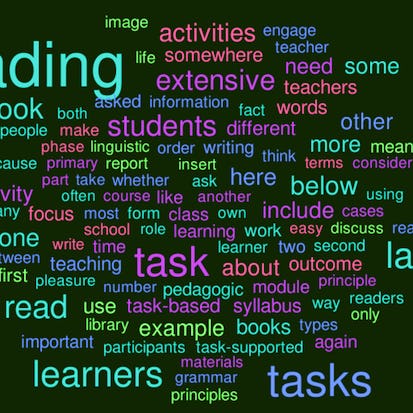- Level Professional
- المدة 23 ساعات hours
- الطبع بواسطة University of London
-
Offered by

عن
This course explores ways of teaching reading skills in English as Second and Foreign Language (ESL/EFL) using a task-based approach. You will be introduced to the concept of task and the key principles of task-based language teaching (TBLT) and learning. TBLT uses communicative tasks as the key unit for creating language learning activities. You will also examine the role of reading in real-life and in second and foreign language teaching and current thinking about the interface between TBLT and second language reading. You will explore how TBLT and teaching second language reading can be successfully integrated in practice through analysing task-based reading materials. The course culminates in creating task-based materials for teaching reading in your own language teaching contexts. After completing the course, you will be able to: 1. Explain the main components and tenets of a task-based approach to teaching language; 2. Explain the main issues involved in teaching reading; 3. Illustrate connections between TBLT approaches and the teaching of reading; 4. Integrate tasks into your own teaching; 5. Identify reading texts that are suitable for the construction of tasks; and 6. Construct reading tasks and sequences for use in your own classroom.الوحدات
Introduction to the Course
1
Videos
- Course Overview
2
Readings
- Learning Outcomes
- Grading and Assessment
Introduction to Module 1
1
Videos
- Task-based Language Teaching: Introduction to Module 1
1.1 What is a Task?
2
Videos
- What is a Task?
- Feedback
2
Readings
- What makes a second language learning activity a pedagogic task?
- Do these three activities constitute tasks?
1.2 Types of Tasks
1
Videos
- Types of Tasks
1
Readings
- What task types do you use in your teaching?
1.3 The Role of the Task in the Syllabus
1
Discussions
- What role do tasks play in your teaching?
2
Videos
- The Role of the Task in the Syllabus
- Feedback
1
Readings
- Are the following extracts, task-based or task-supported syllabuses?
1.4 The Rationale for Using Tasks in Language Teaching
1
Discussions
- What theoretical and practical rationales underlie TBLT?
1
Videos
- The Rationale for Using Tasks in Language Teaching
1.5 The Task-based Lesson
1
Discussions
- How do you typically structure a task-based sequence?
1
Videos
- The Task-based Lesson
1
Readings
- Can you identify the stages in this task sequence?
1.6 Interview with Nick Andon
1
Videos
- Interview with Nick Andon
Peer Assessment
1
Peer Review
- Producing an Information Sheet on Tasks in Second Language Teaching
References and Additional Reading
2
Readings
- References
- Additional Reading
Introduction to Module 2
1
Videos
- Introduction to Module 2: Overview of Reading Issues
1
Readings
- What We Read
2.1 Reading as a Cognitive Activity
1
Videos
- Reading as a Cognitive Activity
2
Readings
- What is Reading?
- Optional Reading on the Simple View of Reading
2.2 Reading as a Communicative Activity
1
Discussions
- Discussing Reading as a Communicative Act
1
Videos
- Reading as a Communicative Activity: Reading In and Out of the Classroom
2
Readings
- How Does Reading Link to Communicative Language Teaching?
- Optional reading: Bringing the Outside World into the Classroom
2.3 Reading as a Strategic Activity
1
Discussions
- Discussing the Teaching of Reading Strategies
1
Videos
- Reading as a Strategic Activity
1
Readings
- Reflecting on Reading Strategies
2.4 Reading and Background Knowledge
1
Videos
- Reading and Background Knowledge
1
Readings
- Optional Reading about Schema Theory
2.5 Examining Background Knowledge in Three Texts
1
Discussions
- Background Knowledge and Your Own Learners
1
Videos
- Feedback on Background Knowledge
1
Readings
- Reading and Background Knowledge Task
2.6 Developing Automaticity and Reading Fluency
1
Videos
- Developing Automaticity in Reading Fluency
Peer assessment
1
Peer Review
- Writing an Action Plan for Improving the Teaching of Reading
References and additional reading
2
Readings
- References
- Additional reading
Introduction to Module 3
1
Videos
- Introduction to module
3.1 Principles for a Communicative, Task-based Approach to Reaching Reading
1
Discussions
- Your reactions to the lecture
1
Videos
- Principles for a Communicative, Task-based Approach to Teaching Reading
1
Readings
- Thinking about reading and the classroom
3.2 Classroom Implications of the Principles for Teaching Reading
1
Discussions
- Discuss the results of the two polls as they emerge.
1
Videos
- Classroom Implications Principles for Teaching Reading
2
Readings
- Classroom implications of the principles for teaching reading
- Optional Reading: Reading and communicative language teaching
3.3 The Three Phase Reading Lesson
1
Videos
- The Three Phase Lesson
1
Readings
- The Three Phase Reading Lesson
3.4 The Three Phase Reading Lesson in Practice
1
Videos
- The Three Phase Lesson In Practice
3.5 Tasks and the Three Phase Reading Lesson
1
Videos
- Tasks and the Three Phase Reading Lesson
2
Readings
- What are the similarities? What are the differences?
- Current practices in teaching EAP reading
3.6 An Alternative Approach to Teaching Reading
1
Videos
- An Alternative Approach to Teaching Reading
1
Readings
- Analysing a Published Teaching Unit
3.7 Interview with Professor Cathie Wallace
1
Videos
- Interview with Professor Cathie Wallace
Peer assessment
1
Peer Review
- Constructing a Jigsaw Reading Task
References and additional reading
2
Readings
- References
- Additional reading
Introduction to Module 4
1
Videos
- Introduction to module 4
4.1 Focus on Language in the Reading Lesson
1
Discussions
- What are some ways to integrate language-focused activities into task-based reading lessons?
1
Videos
- Focus on Language in the Reading Lesson
4.2 Pre-teaching Vocabulary
1
Discussions
- Do you pre-teach vocabulary before setting students a reading task?
2
Videos
- Pre-teach or Not to Pre-teach Vocabulary
- Feedback
1
Readings
- Are the following vocabulary pre-teaching activities examples of rich instruction?
4.3 Glossing
1
Videos
- Glossing
2
Readings
- What type of information can be included in glosses? What rationale underlies glossing?
- Sharing a glossed text
4.4. Textual Input Enhancement
1
Videos
- Textual Input Enhancement
3
Readings
- To what extent can textual input enhancement draw learners' attention to language while reading?
- Which enhanced text is more likely to succeed in drawing learners' attention to the targeted constructions?
- Feedback: Insights emerging from the studies
4.5 Language Focus in the Post-task Phase
1
Discussions
- Do you tend to plan for post-reading language-focused activities?
1
Videos
- Language Focus in the Post-task Phase
4.6 Interview with Dr. Parvaneh Tavakoli
1
Videos
- Interview with Dr. Parvaneh Tavakoli
Peer assessment
1
Peer Review
- Designing a Pre-reading or Post-reading Language-focused Activity
References and additional reading
2
Readings
- References
- Additional reading
Introduction to Module 5
1
Videos
- Extensive Reading: Introduction to module
5.1 What is Extensive Reading?
1
Discussions
- Discussing the Importance of the Principles
1
Videos
- Defining Extensive Reading
2
Readings
- The Characteristics of Extensive Reading Programmes
- Ten Principles of Extensive Reading
5.2 The Benefits of Extensive Reading
1
Discussions
- Discussing the Benefits of Extensive Reading
1
Videos
- The Benefits of Extensive Reading
1
Readings
- What do you already know about the benefits of Extensive Reading?
5.3 Read Easy, Read a Lot
1
Videos
- Read Easy, Read a Lot
2
Readings
- Why is reading easy texts important?
- Optional Reading: Beglar and Hunt (2014)
5.4 Task-based Elements of Extensive Reading
1
Discussions
- What would you like to try?
1
Videos
- Extensive Reading and Tasks
2
Readings
- How can we connect Extensive Reading with the use of tasks?
- Choosing a Cover for a Book
5.5 Overcoming Obstacles to Extensive Reading
1
Discussions
- Discussing Ways of Overcoming Possible Obstacles
1
Videos
- Overcoming Obstacles to Extensive Reading
1
Readings
- What can prevent teachers from implementing an Extensive Reading programme?
5.6 Reading Circles: Interview with Sam Duncan
1
Videos
- Reading Circles: Interview with Sam Duncan
Module Assessment
1
Peer Review
- Preparing a Presentation about Extensive Reading
References and Additional Readings
2
Readings
- References
- Additional Reading
Introduction to Module 6
1
Videos
- Introduction to module 6
6.1 Finding Suitable Texts
1
Discussions
- Sources for Texts
1
Videos
- Finding Suitable Texts
2
Readings
- Where would you find suitable texts to use for constructing reading activities?
- Optional Reading
6.2 Designing Suitable Tasks for Text
1
Videos
- Designing Suitable Tasks for Texts
6.3 Adapting Reading Tasks
1
Discussions
- Other ideas for adapting the activities and exercises from these units to a task-based approach.
1
Videos
- Adapting Reading Tasks
1
Readings
- Are there any ways in which you can create activities that are more task-like than the ones in the current version of the units?
6.4 Interview with Caroline Herring
1
Videos
- Interview with Caroline Herring
6.5 Interview with Professor Pauline Foster
1
Videos
- Interview with Professor Pauline Foster
Module Assessment
1
Peer Review
- Constructing a Task-Based Reading Activity
References and Additional Readings
2
Readings
- References
- Additional Reading
Auto Summary
"Teaching EFL/ESL Reading: A Task-Based Approach" is a professional-level course on Coursera designed for educators in the ESL/EFL domain. Focused on integrating task-based language teaching (TBLT) with reading instruction, it covers key principles, real-life applications, and material creation. The 1380-minute course offers valuable insights into enhancing reading skills through communicative tasks. Available through Starter, Professional, and Paid subscriptions, it's ideal for language teachers seeking effective, practical strategies.

Dr Amos Paran

Dr Andrea Révész

Dr Myrrh Domingo


